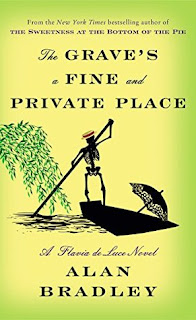The Grave's a Fine and Private Place
This is my fourth Flavia de Luce mystery, and I'm glad to say that The Grave's a Fine and Quiet Place was quite engaging. A few things you have to overlook, such as that for a twelve-year-old girl, Flavia encounters a lot of murders, and that she's aging very slowly (I believe only a year or two has gone by but this is the tenth book in the series).
We pick up from the last book, after Flavia's father has died. Her relationship with her sisters, Daffy and Feely, has only gotten worse. She's become closer to the gardener, Dogger, who has become a father figure. All of them are punting down a river in the English countryside when Flavia, dangling her fingers in the water, snags the teeth of a corpse.
He was Orlando Whitbread, an aspiring actor. Flavia, an expert in chemistry, is also an expert in poison, and she smells something on Orlando, despite his stay in the water. She examines the body after it is pulled from the water and before the police get there: "To me, an unexamined corpse was a tale untold: a knotted ball of a tale that was simply crying out to be unraveled until the last strand had been picked free." Was it suicide, an accident, or murder? She also has to solve the poisoning of three old ladies after they take communion in a church.
The charm of these books is Flavia's narration. At the beginning of the book, she is once again contemplating being dead, and thinks about cyanide. "I think it was the slobbering, more than anything, that put me off the cyanide. What self-respecting young woman would want to be found dead in her bedroom drowned in her own drool?" Later in the novel, when she and Dogger team up as amateur sleuths, she thinks: "Had Dogger been there, I’d have asked him to fetch me up a whole hog on a plate, which I’d tuck into with fangs and flying fat, like Henry VIII. I would let out a belch of gratitude, and then we’d be off, renewed: a pair of old hounds hot on the trail of a cold-blooded murderer." And who can beat a line like: "What can you possibly say to a child who has helped his father pump preservatives into the carotid artery of a hanged murderer?"
Alan Bradley, despite Flavia never seeming to age, has carried her story forward in the books. He specifies that the year is 1952 and George VI is dead and Princess Elizabeth has not yet been crowned. He also develops the characters. I basked in the relationship between Flavia and Dogger (by the last lines, they are due for more mysteries) and that she gets closer to her sister Daffy, who is a lover of literature. A poem will be key to the mystery, and Daffy shows her how to interpret it. Flavia, who before was purely into science, decides she needs to study poetry and Latin. Bradley titles his novels from literature (this one is from Andrew Marvell) so I'd love to see more literary mysteries.
We pick up from the last book, after Flavia's father has died. Her relationship with her sisters, Daffy and Feely, has only gotten worse. She's become closer to the gardener, Dogger, who has become a father figure. All of them are punting down a river in the English countryside when Flavia, dangling her fingers in the water, snags the teeth of a corpse.
He was Orlando Whitbread, an aspiring actor. Flavia, an expert in chemistry, is also an expert in poison, and she smells something on Orlando, despite his stay in the water. She examines the body after it is pulled from the water and before the police get there: "To me, an unexamined corpse was a tale untold: a knotted ball of a tale that was simply crying out to be unraveled until the last strand had been picked free." Was it suicide, an accident, or murder? She also has to solve the poisoning of three old ladies after they take communion in a church.
The charm of these books is Flavia's narration. At the beginning of the book, she is once again contemplating being dead, and thinks about cyanide. "I think it was the slobbering, more than anything, that put me off the cyanide. What self-respecting young woman would want to be found dead in her bedroom drowned in her own drool?" Later in the novel, when she and Dogger team up as amateur sleuths, she thinks: "Had Dogger been there, I’d have asked him to fetch me up a whole hog on a plate, which I’d tuck into with fangs and flying fat, like Henry VIII. I would let out a belch of gratitude, and then we’d be off, renewed: a pair of old hounds hot on the trail of a cold-blooded murderer." And who can beat a line like: "What can you possibly say to a child who has helped his father pump preservatives into the carotid artery of a hanged murderer?"
Alan Bradley, despite Flavia never seeming to age, has carried her story forward in the books. He specifies that the year is 1952 and George VI is dead and Princess Elizabeth has not yet been crowned. He also develops the characters. I basked in the relationship between Flavia and Dogger (by the last lines, they are due for more mysteries) and that she gets closer to her sister Daffy, who is a lover of literature. A poem will be key to the mystery, and Daffy shows her how to interpret it. Flavia, who before was purely into science, decides she needs to study poetry and Latin. Bradley titles his novels from literature (this one is from Andrew Marvell) so I'd love to see more literary mysteries.



Comments
Post a Comment